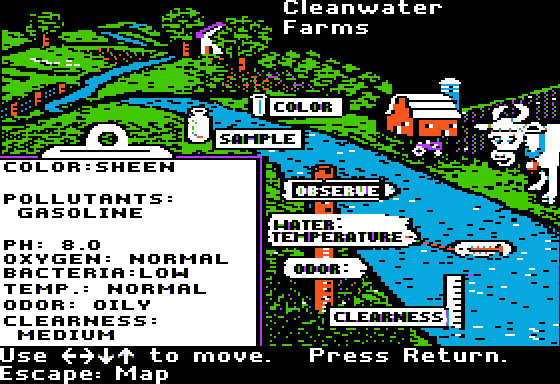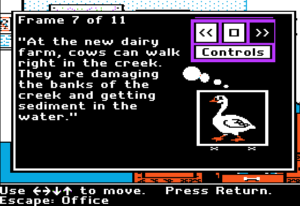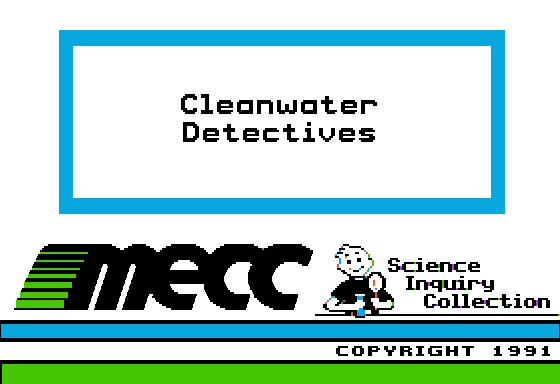Cleanwater Detectives 
If you went to school in the United States in the 80s and 90s, and if your school had a computer lab, you probably played something by the Minnesota Educational Computing Consortium. MECC were the developers of beloved educational games like The Oregon Trail, the Munchers series, and Storybook Weaver, but that barely scratches the surface of their enormous library of software. Beyond their biggest hits, they put out a ton of low-key educational games that aren’t so well-remembered.
If you look through a catalog of MECC’s software for the Apple II computer, you’ll find games like Subtraction Puzzles, a game that teaches kids about subtraction, or my personal favorite, Salt and You, an interactive slideshow about the dangers of a high-sodium diet. That’s certainly a wide range of products! It goes all the way back to MECC’s origins as a state-owned organization, when they developed software for use in Minnesota schools. A game like Salt and You might not’ve been as exciting as Number Munchers, but teachers could easily fit it into their classes, and all things considered, it wasn’t a bad way to use a computer in the classroom in the 1980s.
One of those unassuming school-friendly products was Cleanwater Detectives, a science education game that MECC released in 1991. And while it’s not the sort of game that schoolkids fondly remember 30 years later, it gave teachers something that was still a bit of a novelty — a way to add some depth and hands-on learning to their science lessons by using a computer.
You’re the newest agent at the Cleanwater Detective Agency, and it’s your job to get to the bottom of where the pollution in the local river is coming from. There’s dozens of towns, parks, farms, and factories up and down the river, and one of them is the culprit. You’re looking for two pieces of information here: the source of the pollution, and the cause of the problem. So how do you narrow it down? You have to use the power of deduction!

Use all your senses (except taste!) to figure out what’s wrong
To start out, you collect water samples from different points along the river, which can help you narrow down where the pollution is coming from. Then you take the samples back to the laboratory to figure out what’s inside. If it smells musky and contains phosphorus, for instance, the problem might be algae. But sometimes it’s hard to find a clear answer, and you need to read up on water facts or listen to the townspeople to see if they noticed anything unusual that might shed light on the situation.
(On the highest difficulty level Enforcer, you also get to choose a punishment for the polluters, ranging from a warning letter to legal action, but there doesn’t seem to be any advice in the game itself about choosing the right penalty. It’s possible that there’s more information in the manual, but either way, this seems like way too much power to give an elementary school kid.)
It’s a smart move by Cleanwater Detectives that sometimes, the results of your investigation won’t tell you the whole story, and you have to take an educated guess. Science isn’t always as cut-and-dry as it is in the lab, and you have to draw the best conclusions you can based on the evidence at hand.

The residents of Clearwater (or, in this case, a goose) might have seen something that would explain the problems with the river
The game only has enough variety to hold your attention for about half an hour, which is the perfect length for a game that was meant to be played in a school computer lab, but it does mean that you’ve seen everything the game has to offer after two or three cases. The secret that makes Cleanwater Detectives work is that, while it’s teaching you about science, it’s also teaching you problem solving and deduction. The process of following the pollution upstream feels like troubleshooting, trying to trace back to the root of a problem in order to solve it. In contrast to a MECC product like Salt and You, which is like a slideshow, the game is giving you context for how the science is used while also quietly training you on skills that you can apply in other situations.
This game was part of the Science Inquiry Collection, a series of titles by MECC that teach kids about science by making them participate in the scientific process, and they all embrace this sort of discovery-based learning. In another one of the Science Inquiry games, Cavity Busters, you learn about dental hygiene, but the game presents it in the form of a scientific experiment to see what habits are more likely to cause or prevent cavities. That distinction — getting you to investigate the information yourself — is what separates the Science Inquiry games from the rest of MECC’s run-of-the-mill science titles.
Come to think of it, the MECC games that stand out the most are the ones that try to get kids to engage with the information on a secondary level, whether it’s The Oregon Trail teaching history in the form of a survival game or Cleanwater Detectives making you sleuth out facts about water quality. It’s a great example of how even the less memorable titles in MECC’s catalog could be an engaging way to fill half an hour of class time.


Looks like the media at the archive.org link got removed…maybe you can point to another source? I’m interested to see that catalog!
Hi Joe, my mistake! I made a copy-and-paste error. The link should work now!
Where can I get MECC Cleeanwater Detective game? When I clik on the page nothing loads….will it work on chromebooks for students?